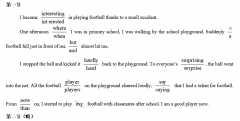2014湖北省八市高三下学期3月月考英语试题答案(3)
There was a pause in their conversation, and it was filled with all kinds of noises. Then he spoke, looking away. “I do not need any sympathy. In fact, all my new students think I never had any kids.” He had a smile, but his eyes were sad.
“Where do you work now?” she asked.
“Future Generation High School.”
She swallowed, in excitement. The school where her daughter studied.
“Do you happen to know Jaya Kumari?”
Something flashed across his face. Anyone else would consider the expression as recalling something. But she knew it was pain. Then his face was calm again.
“No.” His answer was short.
“Well, she is my daughter.”
Her daughter was a topper, a gold medalist in the Math State Competitions. He was pretending.
The bus stopped. She stood up and looked down at him. “I was your daughter’s best friend. You must surely remember me...”
“Excuse me,” he said, looking nervous. “I do not want this conversation. Someday, you’ll see that it is easier to bury the past.” He said, and went back to his graph.
“Her loss was hard on me too,” she continued calmly. “I named my daughter after her.”
51. What does the underlined part mean?
A. His dream was to be a poet. B. He wasn’t equal to teaching math.
C. He didn’t look like a math teacher. D. He was silent and used to be a librarian.
52. According to the passage, when the woman was in middle school, Mr. Rao was probably .
A. soft-hearted B. irresponsible C. indifferent D. strict
53. The woman remembered his math teacher probably because ________.
A. he was often made fun of by his students B. they both suffered the loss of loved ones
C. he was handsome but always looked sad D. he taught well and was kind to girl students
54. The man refused to admit knowing the woman’s daughter because ________.
A. he never recovered from his daughter’s death.
B. he hated discussing about his job after work.
C. her daughter was not clever enough to stand out.
D. the name of her daughter was not familiar to him.
B
According to a recent article in The Wall Street Journal, we might all be braggarts(大话王) in this competitive society addicted to social networking.
Take a close look at your social-networking sites. Do you like to post photos of yourself in restaurants to show others what an exciting life you have? Or do you like to write about how happily in love you are? Or perhaps you are of the subtle type who constantly complain about jobs but really just want to impress others with your important position.
According to the results of a series of experiments conducted by Harvard University neuroscientists(神经科学家), the reward areas of our brain--the same areas that respond to “primary rewards” such as food --are activated when we talk about ourselves. We devote between 30 to 40 percent of our conversation time to doing just that. Unfortunately, Bernstein says, some people can’t tell the difference between sharing positive information that others might actually want to know and direct bragging. She suggests that bragging involves comparison, whether stated or implied.
“We are expected to be perfect all the time. The result is that more and more people are carefully managing their online images”. says Elizabeth Bernstein, a columnist with the Wall Street Journal.
But the issue is not limited to the Internet. In a fiercely competitive job market we must sell ourselves on multiple platforms and show that we are better than others. In fact, we have become so accustomed to bragging that we don’t even realize we are doing it, says Bernstein. This is harmful to our relationships and puts people off.
Bernstein talked to some experts who said that people brag for all sorts of reasons: to appear worthy of attention; to prove to ourselves we are doing fine and that people who said we would fail are wrong; or simply because we’re excited when good things happen to us.
“Feel sorry for them, because they’re doing this unconscious, destructive thing that won’t help them in the long run,” said Professor Simian Valier, a research psychologist at Washington University.
55. The underlined word “subtle” in Para.2 is closest in meaning to “ “.
A. hidden B. apparent C. outstanding D. simple
56. Which of the following is one of the features of braggarts?
A. They control conversation and only talk about themselves.
B. They know well how to share positive information.
C. They self-promote to stand out in their career.
D. They don’t pay much attention to their online image.
57. What can we infer from the passage?
A. Braggarts make a good first impression but the effect decreases over time.
B. People who like bragging know what they are doing.
C. Braggarts always adopt comparison directly to show they are excellent.
D. They care much about the feelings of others when talking.
58. Which would be the best title for the passage?
A. Are you a braggart? B. Society addicted to networking
C. Why do we keep on bragging? D. How to deal with a braggart?
C
Password (密码) strength has been a topic about the Internet lately. I have seen lots of clever methods for generating and remembering strong passwords. Some are better than others, but in my opinion, none are adequate. Here’s the problem: It doesn’t matter how strong your passwords are if you use the same one on multiple sites. All it takes is for a site to get hacked(侵入), like Gawker media, or even Sony did, and now your super-strong password has been stolen, and every site on which you used that password has been accessed.





